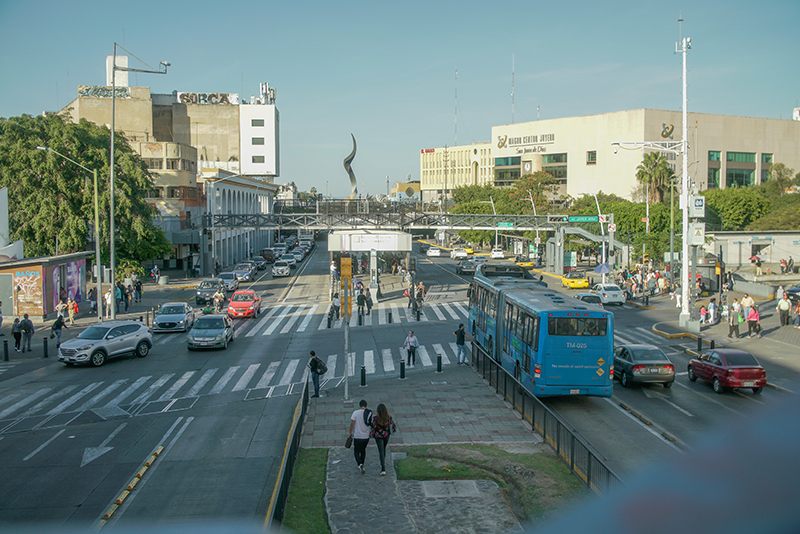Learning for sustainable urban mobility in Latin America: results from EUROCLIMA+

The Urban Mobility sector of the EUROCLIMA+ programme held its annual meeting of members and beneficiaries last February. This was possible thanks to the joint work of national focal points, local and national authorities from 12 Latin American countries, as well as international partner institutions. The goal of this event was to work together to increase the ambition of transport in the Nationally Determined Contributions (NDC).
The health contingency due to COVID-19 involved challenges in the implementation of our projects. It also allowed us to realise how unsustainable and inequitable urban mobility and transportation can be in many Latin American cities by discovering the role they play in that pandemic. How to turn challenges into opportunities? The challenges also brought with them a number of lessons. In this context, we present some of the most important ones for EUROCLIMA+ in 2020.
Taking advantage of digital platforms’ benefits
The virtual platform of the regional Community of Practice implemented with the MobiliseYourCity Partnership was presented during our annual meeting at the Sustainable Transport Week in Latin America and the Caribbean. This social event brought together key actors of the transport sector in the region and was an opportunity to share knowledge and experiences to create synergies in the transition towards sustainable and low-carbon urban mobility in the region.
The Community of Practice organized and co-organized 23 webinars this year on topics such as SUMPs, gender and mobility, urban cycling, electric mobility, resilience and transport to promote the exchange of knowledge in digital forums allowing us to establish a dialogue with more than two thousand participants from Latin America and several European countries.
We would also like to highlight the closing of the second course of the SUMP Learning Program in Latin America, which was carried out virtually. With the participation of 72 local authorities from 23 cities, we provided tools and training to improve institutional capacities in the development of local mobility plans.
Improving multi-sectoral efforts
The COVID-19 emergency made us understand the importance of initiatives promoting sustainable development to turn to another crisis that needs to be addressed: climate change. We know that this cannot be done individually or from a single perspective, which is why it is important to link transport actions with climate policies in an intersectoral manner.
In the middle of the year, we launched the campaign "Increasing the ambition of transport in the Nationally Determined Contributions" where we discussed the importance of these efforts with the EUROCLIMA+ national focal points and the European Union’s ambassadors in Latin America. This was integrated by six actions developed by GIZ experts to link transport actions with the Paris Agreement and Agenda 2030 and also through 10 key actions to increase the ambition of transport in the NDC, developed by SLOCAT, WRI, GIZ and ITDP with the support of EUROCLIMA+. This effort triggered the workshop "Long term strategies for the transport sector in Latin America and the Caribbean", which took place in mid-November.
Moreover, the EUROCLIMA+ programme started pilot experiences of Country Dialogues, a strategic commitment of cooperation to support member countries of the programme in the implementation of NDCs, addressing the needs from different perspectives. At the same time, the Urban Mobility sector held the virtual workshop series “Developing NUMPs in Latin American countries”, in which around 30 national representatives and political decision-makers from Chile, Ecuador, Uruguay and Brazil participated.
Adapting projects to the new reality
Rather than stopping the work dynamic, this year allowed us to adapt our actions in order to continue promoting the transition of Latin American cities towards sustainable urban mobility through our 19 projects.
The SUMP development in Antofagasta (Chile) is in a scenario-building phase, which was possible thanks to the efforts of the team and the authorities to organize virtual workshops and online citizen surveys. The SUMP in Ambato, which was in development and diagnostic phase, adapted its next steps, such as the development of objectives, goals, definition of strategies and implementation, to this new context. This led to the creation of the COVID-19 Emerging Mobility Plan, which includes the creation of pilot projects such as emerging bicycle paths and street pedestrianization, which will serve as inputs for the SUMP itself.
We are also pleased to announce that the canton of Montes de Oca has started the construction of cycling infrastructure. This will connect with other municipalities in Costa Rica, mainly with Curridabat, as part of the pilot project to promote urban cycling in the region. The cycling infrastructure project in La Paz, Bolivia, also supported the construction of emerging bicycle paths. In the case of the NUMPs, whose new guidelines were recently launched at the En Route to COP26 event, Chile and Uruguay have made successful progress in a series of workshops to build scenarios into their national urban mobility strategies and policies. We have managed to bring together key actors from different ministries and institutions at the national level interested in building actions within the framework of these projects.
Despite the challenges that this complicated year has brought, the Urban Mobility sector of EUROCLIMA+ developed new lessons learned to strengthen its goal of assisting Latin American countries in the implementation of NDCs from the transport sector.